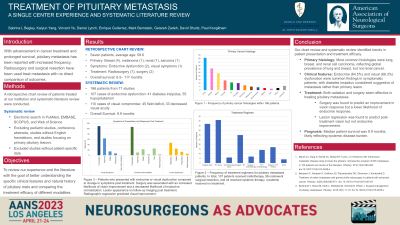Treatment of Pituitary Metastasis: A Single Center Experience and Literature Review
Friday, April 21, 2023


Sabrina Begley (she/her/hers)
Medical Student
Department of Neurosurgery, Zucker School of Medicine at Hofstra/Northwell
Bayside, New York, United States
ePoster Presenter(s)
Introduction: Pituitary metastasis is a rare condition. Our understanding of the natural history and optimal treatment strategy is limited.
Methods: We retrospectively reviewed patients assessed at our multidisciplinary brain metastasis clinic from July 2010 to June 2021 collecting demographic data, treatment information, and patient outcomes. In addition, we performed a scoping review of the topic.
Results: We identified eight patients at our center who underwent treatment of their pituitary metastases. Breast cancer (50%) was the most common primary cancer in our cohort. The majority (75%) were diagnosed incidentally on surveillance magnetic resonance imaging (MRI); one patient was symptomatic with endocrine dysfunction and another with visual compromise. Most patients (75%) were treated with radiosurgery. One patient with breast cancer demonstrated response to immunotherapy. The patient with visual dysfunction underwent surgical resection and decompression of optic chiasm; histological diagnosis led to the diagnosis of primary cancer. Our scoping review identified 167 patients in 71 relevant studies. The most common primary cancer was lung (29.3%) followed by breast (19.7%) and renal (13.2%) cancer. The latency period varied from 0 to 180 months. 109 presented with endocrine dysfunction; 57 presented with diabetes insipidus, 91 presented with anterior pituitary dysfunction. 96 presented with visual compromise. Regarding treatment 101 patients received radiosurgery, 94 underwent surgical resection and 32 received systemic chemotherapy/immunotherapy. Median reported survival was 9.25 months (range: 0.3 – 70). Data are limited on the effect of pituitary metastasis on overall survival and the effectiveness of radiosurgery vs surgery, given the lack of direct comparison available.
Conclusion : Pituitary metastasis is a rare condition in cancer patients. Radiosurgery and surgical resection have been frequently used in the treatment of this condition and both demonstrate efficacy. Immunotherapy with good central nervous system penetration should be considered in selected patients with positive markers.
Methods: We retrospectively reviewed patients assessed at our multidisciplinary brain metastasis clinic from July 2010 to June 2021 collecting demographic data, treatment information, and patient outcomes. In addition, we performed a scoping review of the topic.
Results: We identified eight patients at our center who underwent treatment of their pituitary metastases. Breast cancer (50%) was the most common primary cancer in our cohort. The majority (75%) were diagnosed incidentally on surveillance magnetic resonance imaging (MRI); one patient was symptomatic with endocrine dysfunction and another with visual compromise. Most patients (75%) were treated with radiosurgery. One patient with breast cancer demonstrated response to immunotherapy. The patient with visual dysfunction underwent surgical resection and decompression of optic chiasm; histological diagnosis led to the diagnosis of primary cancer. Our scoping review identified 167 patients in 71 relevant studies. The most common primary cancer was lung (29.3%) followed by breast (19.7%) and renal (13.2%) cancer. The latency period varied from 0 to 180 months. 109 presented with endocrine dysfunction; 57 presented with diabetes insipidus, 91 presented with anterior pituitary dysfunction. 96 presented with visual compromise. Regarding treatment 101 patients received radiosurgery, 94 underwent surgical resection and 32 received systemic chemotherapy/immunotherapy. Median reported survival was 9.25 months (range: 0.3 – 70). Data are limited on the effect of pituitary metastasis on overall survival and the effectiveness of radiosurgery vs surgery, given the lack of direct comparison available.
Conclusion : Pituitary metastasis is a rare condition in cancer patients. Radiosurgery and surgical resection have been frequently used in the treatment of this condition and both demonstrate efficacy. Immunotherapy with good central nervous system penetration should be considered in selected patients with positive markers.
